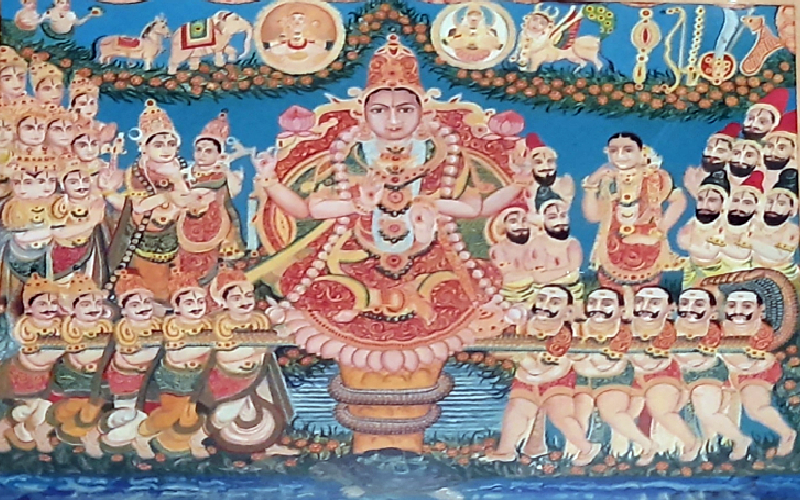
Amṛta Mandana Lakṣmī – Attainment of all round prosperity due to teamwork
Long ago, Indra, the King of Amarāvatī was at the zenith of power. One day in an inebriated state, he threw a fragrant lotus garland offered by the great sage, Durvāsā towards his white-skinned, six-tusked, elephant, Airāvata. The elephant threw the garland on the ground and trampled the same. An angry Durvāsā cursed Indra, “O vain one, you do not have the sense to respect the wealth and power bestowed upon you. May Lakṣmī abandon you this very moment.” Immediately the heavens lost their effulgence and Indra lost all his power. No sooner did this happen a pall of gloom descended upon the universe. Immediately, the Devā-s led by Indra approached Lord Viṣnu for help.
On the advice of Lord Viṣnu, they decided to churn the Milk ocean with Mount Mandarā as the spindle with the Great Serpent, Vāsukī serving as the rope that would enable them to churn the Milk ocean. The objective was to recover their good fortune in the form of Lakṣmī who had disappeared from the Milk ocean due to the curse of Durvāsā and also to get Amṛta, the elixir of immortality for the Devā-s led by Indra. The team of Devā-s and Asurā-s churned the Milk ocean for several hundreds and thousands of years with Bṛhaspati (Devagurū) and Śukra (Asuragurū) chanting hymns in praise of Lakṣmī. It was during this time that Lord Viṣnu incarnated as Kūrma, the tortoise, in order to keep Mount Mandāra safe on his hard back to enable the churning of the Milk ocean. The churning caused great disturbances on Mount Mandāra and the Divine Serpent, Vāsukī vomited venom thereby adding difficulties to this great cosmic venture. Despite all this the team of Devā-s and Asurā-s continued to churn without pause.
Pleased by their persistence, Lakṣmī emerged along with a variety of beings, and treasures amongst other things. Draped in a red sari, Lakṣmī looked resplendent with a diamond studded crown, jewels of every description – armlets, bracelets, anklets, nose rings, finger rings, toe rings, necklace etc., studded with precious gems adorned her. Looking at this divine spectacle, Gods sang songs, Asurā-s danced with joy and sages blew their sacred conches. Several gifts of prosperity and Halāhal, the deadliest poison came out of the Milk ocean, thanks to the divine churn. Nobody wanted to go near the poison, but Lord Śiva took the same in order to protect the universe.
Everybody scrambled to claim the rest of the treasures that emerged from the sea.
The Devas took the divine six-tusked elephant, Airāvata; the Asurā-s took the virile seven-headed flying horse called Uccaiśravā; the Ṛṣi-s took the cow, Kāmadhenu, whose udders contained every kind of food that was required for prayers, yagnas and the rest of the world; the Yakṣā-s took the wish-fulfilling tree, Kalpataru, which was capable of fulfilling wishes and also bearing all kinds of fruits; the Nāgā-s took the jewel, Cintāmaṇi, the desire fulfilling gem, which could turn every dream into reality. All these treasures together continue to be the perfect symbols of Arthā otherwise known as worldly fortune.
Besides this, gifts of power, pleasure and health emerged from the Milk ocean. The gifts of power included, the Sārangā bow – a symbol of poise and direction, the divine conch, Pāñcajanyaṁ – the herald of victory. These were reserved by Lakṣmī for the one worthy of universal kingship, for such a ruler had to establish Dharma – righteous code of conduct throughout the universe. Lord Viṣnu was the only one who sought nothing and pleased by the same Lakṣmī gave him the bow, the conch, and then took the Vaijayantī garland, placed it around his neck thereby accepting him as her eternal consort.
The Gifts of Pleasure included Sura, the Goddess of wine – a handmaiden of Lakṣmī, Raṁbhā and other damsels who were adept with the 64 methods to add the pleasure to the senses while amusing the mind. Rambha held a garland of bright and fragrant flowers known as Vaijayantī. Manmatha, the God of Kāma or indulgence emerged along with his mother Lakṣmī. The handsome Kāma rode a parrot, held a sugarcane bow and five-flower arrows that were powered to rouse the five senses. The aquatic creature, Makara that happened to be the part fish, part goat, and part elephant served as his emblem.
Dhanvantri, the divine physician who in turn was an incarnation of Viṣnu brought along the science of health and healing popularly known as Amṛta. Only the gift of health allowed the world to enjoy the gifts of Goddess Lakṣmī. Therefore, it is no surprise that everybody wanted the same and they fought over it. Viṣnu took the form of Mohinī, the enchantress, charmed the Asurā-s while taking away Amṛta from them and distributed it to the Devā-s. The Asurā-s had the Sanjīvinī Vidyā which could bring back people to life while the Devā-s had acquired immortality by partaking Amṛta and therefore, the balance of power was restored in the universe.
Since nobody claimed the nymph, the wine and the doctor, they became available to one and all. Having been selfless, Lord Viṣnu had been fully united with Lakṣmī and he placed her on his chest therefore he came to be known as Śrīnivāsa. The symbol of Lakṣmī on his chest is known to us as Śrīvatsa. The four-armed or Caturbhuja Viṣnu holds a discus representing the rhythmic order or rites that he establishes in nature, the conch-shell trumpet is the one with which he warns people not to hurt Lakṣmī. Kaumodakī, the mace, is the one with which he punishes all those who hurt Lakṣmī, Padmā or Kamalā is the Lotus with which he offers the beauty and wealth of Goddess Lakṣmī to all who do their duties. The universal protector, Viṣnu also adds Lakṣmī to his name as a prefix thereby symbolizing the need for wealth required to protect and sustain the universe.
The story of Amṛta Mandana Lakṣmī is significant for it gives the genesis of a team seeking fortune and to whoever seeking different forms of wealth at using the same means. It also does demonstrate how wealth is shared on a complementary basis while the grace of the Almighty, quick wit, timely innovation as well settles wealth in the hands of the deserving at times of contradiction and competition. We also get to learn that the Great Goddess of Fortune, Hiramayī Lakṣmī, bestows abundant wealth from the Akṣaya Pātra containing grain and gold found ever in her arms to the hard-working, kind, spiritual, ever-devoted, humble, charitable, and loving people for ever and ever.
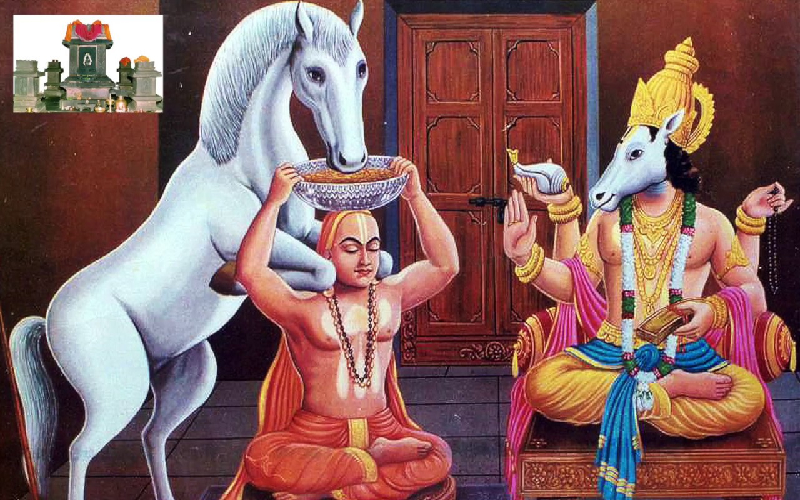
Lakṣmī Śobhana by Vādirājā
Saint Vādirājā (1480 - 1600) has given us the composition, ‘Lakṣmī Śobhana’ and it contains 112 verses. The saint became a Sanyasi at the age of 8 and continued to be so for the next 112 years! It is a matter of divine coincidence that the number of verses and his Sanyāsa Krama match perfectly. Vādirājā must have composed this work somewhere in the middle of his life and therefore people who were his contemporaries would have been able to understand the importance of the number 112.
‘Lakṣmī Śobhana’ was composed by Vādirājā in the way that he dreamt of Śrī Mahālakṣmī. He talks about the marriage of Goddess Lakṣmī to Nārāyaṇa when she emerged out of the Kṣīra Sāgara (Ocean of milk). Śobhana or Maṅgala means auspiciousness. Goddess Lakṣmī is Sarvamaṅgalā for she bestows all the 16 forms of wealth to her devotees. Recitation of the powerful ‘Lakṣmī Śobhana’ is highly meritorious and will bless the unmarried girls with a good husband. It is also believed to bring in peace, prosperity and auspiciousness at the home or the place where it is recited. People may recite the ‘Lakṣmī Śobhana’ once in a way or on auspicious day in front of this Hiranmayī Lakṣmī Casket.
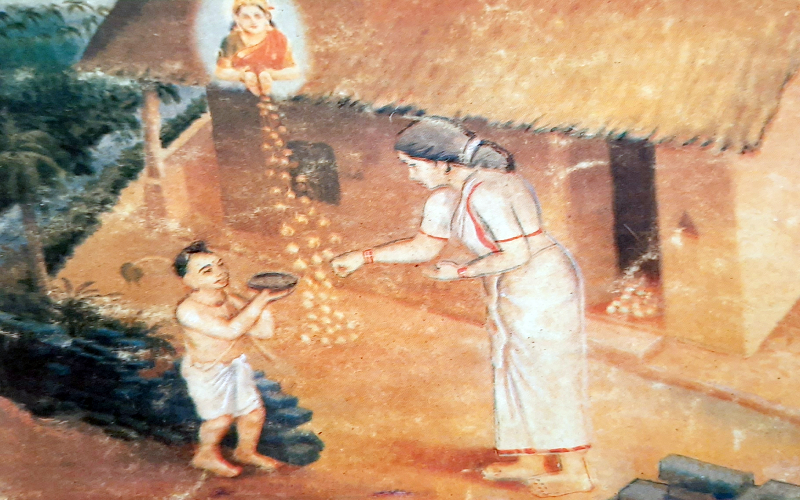
Ādi Śaṅkara & The Sacred Kanakadhāra Stotraṁ
Ādi Śaṅkara was amongst the greatest philosophers of the world. His works and compositions have helped people to elevate themselves. He began his life quite early and used to seek alms in the neighborhood. One day, Śaṅkara reached the house of poor family and sorted alms from them. The lady of the house was keen to offer Bhikṣā to the lustrous boy but did not have anything else except an Amlā kept soaked in a container. She took that Amlā and offered it with love to Śaṅkara. The young Sanyāsī was pleased due to the noble intent and devotion of the lady of the house. He decided to seek the blessings of Goddess Lakṣmī in the interest of the family of the noble lady. Śaṅkara composed the magnificent, ‘Kanakadhāra Stotraṁ’ on the spot and lo! Goddess Lakṣmī rained golden Amlā-s instantly. Thereafter, the family continued to stay amidst abundance for good. It has become a custom to recite the sacred ‘Kanakadhāra Stotraṁ’ in order to endow the household with prosperity.
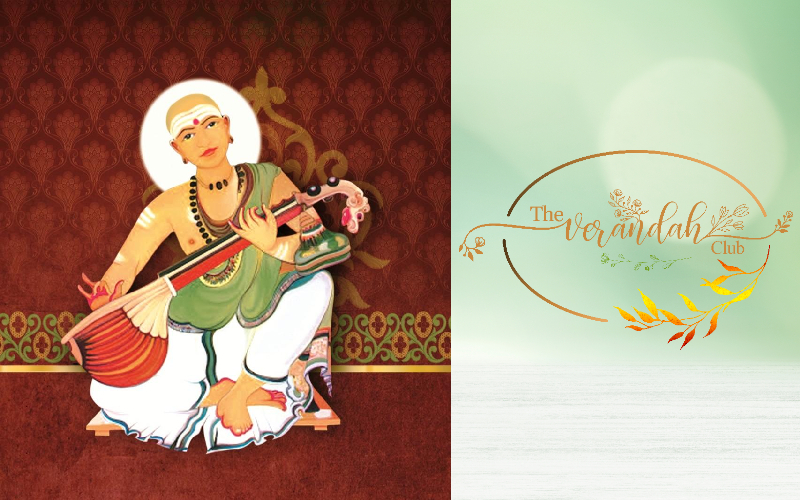
Hiranmayī Lakṣmī and Dīkṣitār
Long ago, during the 18th and 19th century, the Thanjavur delta was fortunate to witness the lives of the Saṅgīta Trimūrtīs, Tyāgarāja, Śyāma Śāstrī, and Muthusvamī Dīkṣitār. Both Tyāgarāja and Dīkṣitār did not seek royal patronage during their entire career. The daughter of Dīkṣitār was to get married and there was a dearth for resources. The wife of Śyāma Śāstrī advised Dīkṣitār’s wife about the possibility of seeking royal patronage which in turn would help the couple raise the required resources. On learning about the same from his beloved wife Dīkṣitār declared, “It is Goddess Lakṣmī who bestows wealth not the mighty ruler. Therefore, I would rather seek Her patronage.” Thereafter, he composed the wonderful Kṛti, ‘Hiranmayīṃ Lakṣmīṁ Sadā Bhajāmī' in Rāgaṁ Lalitā set to Rūpaka Tāḷaṁ. That right moment, Goddess Lakṣmī came forth in the dreams of the Dīkṣitār couple and assured them everlasting prosperity. Going by these stories from the recent and distant past it is but appropriate to propitiate on Goddess Lakṣmī, the bestower of fortune.
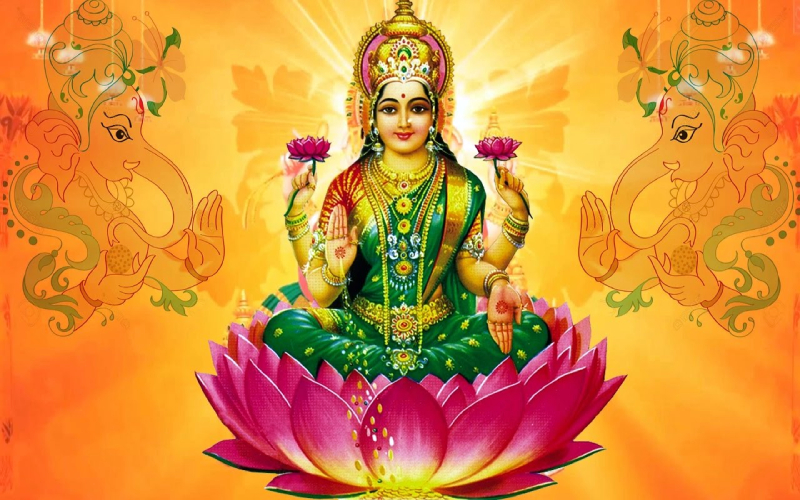
The Origin of Hiranmayīṃ Lakṣmīṁ
One, Rajesh Govindarajulu of Coimbatore, India hails from a reckoned family of jewellers. His great grandfather, Shri. P. A. Raju Chettiar, the Great Merchant Prince was not only a philanthropist but also the first to hallmark jewellery with a guarantee to buy back the same at any given point of time. Over the years, fluctuating fortunes put Rajesh in a difficult financial condition. While he was looking out for succour his grand aunt, D. Shantha advised Rajesh to pray to Goddess Lakṣmī in order to beget permanent fortune. The procedure for Pūjā was prescribed by her and thanks to the same, the family harvested progress accompanied by prosperity. Several such families followed the same and they continue to enjoy the benevolence of Lakṣmī.
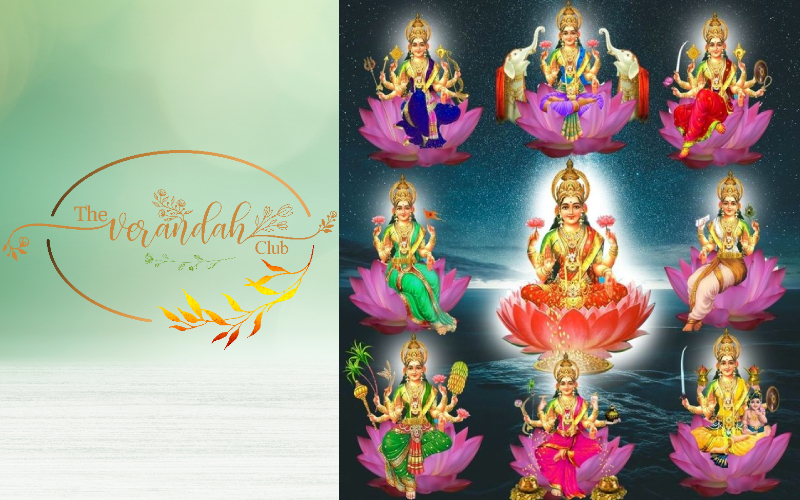
Hiramayī Lakṣmī and the Sixteen Forms of Wealth
One who propitiates the Goddess of Wealth, Hiramayī Lakṣmī on a regular basis is sure to be blessed with the most auspicious 16 forms of wealth which include,
1. Endless fortune and prosperity (Ādi Lakṣmī).
2. Money and riches (Dhana Lakṣmī).
3. Sufficient availability of food (Dhānya Lakṣmī).
4. Power, authority, and vehicles (Gaja Lakṣmī).
5. Progeny (Santāna Lakṣmī).
6. Valor, patience, and objectivity (Vīra Lakṣmī).
7. Victory and focus on goals (Vijaya Lakṣmī).
8. Education, talent, and knowledge (Vidyā Lakṣmī).
9. Wisdom and Intellect (Medhā Lakṣmī).
10. All-round prosperity (Bhāgya Lakṣmī).
11. Good name and fame (Kīrti Lakṣmī)
12. Sound health, devoid of diseases (Ārogya Lakṣmī).
13. Siddhi powers and grant anything you pray for (Siddhi Lakṣmī).
14. Enchanting beauty (Soundarya Lakṣmī).
15. Societal Position and Mokṣa (Samrājya Lakṣmī).
16. Auspiciousness (Mangala Lakṣmī).

The Most Auspicious Days of the Year
Our ancient tradition guides us to seek auspicious days for worship and conduct of important events. On-going through the scriptures one can discover few such full auspicious days, they are Ugadi, Akṣaya Tṛtīyā, Vijayadaśamī, Bali Patūjā, and one can perform any good deed or get set on these days. Of those days the Vijayadaśamī, and Akṣaya Tṛtīyā are completely auspicious while Bali Patūjā, the day next to Dīpāvali is considered to be important only for the first half of the day. We can be rest assured that worship of Hiramayī Lakṣmī on such auspicious days in particular will ensure health, wealth, and happiness.
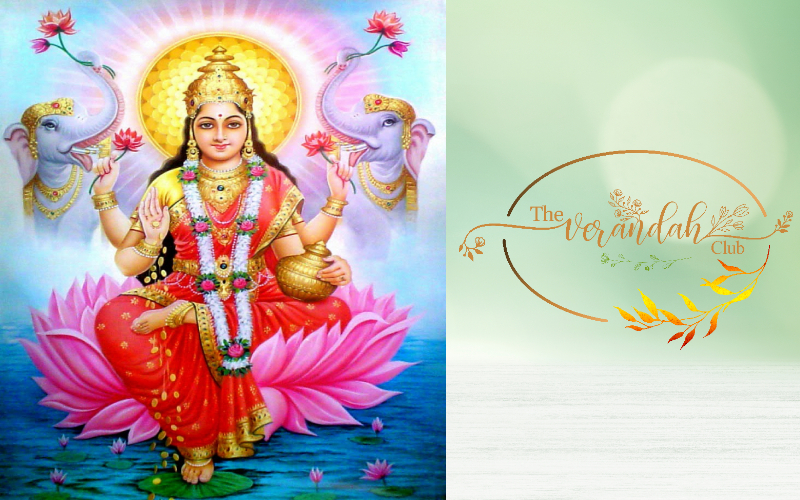
The Kartā and The Lakṣmī
(Story to be read for the Pūjā)
Once upon a time there lived a Kartā of a large joint family. The family consisted of four generations sharing the fruits of inheritance and hard work under one roof. The Kartā or the family head and his wife enjoyed and nurtured the abundance of good matrimony and unity amongst the members of their family. Therefore, everyone enjoyed good health, wealth, progeny, longevity, goodwill, and joy for generations together.
The Kartā and his Dharmapatnī were in the habit of offering prayer to Goddess Lakṣmī and her divine husband Lord Nārayaṇa during the early hours of the day on a regular basis. Later, they would partake the offering made to the divine couple with the rest of the family. One morning the Kartā saw a golden hued radiant lady of great beauty in the Pūjā altar. On seeing the Kartā and his homemaker, this golden hued lady said, “My dear children, I am Lakṣmī and I have been residing here for several years. Your loving devotion is much appreciated. It is my duty to move and share the fortune of the universe with a lot of good people. Therefore, the time has come to leave this household and move on. In return for your devotion, I wish to offer a boon to your family before I leave. Please seek a boon that will do a lot of good and kindly ensure that it does not bring in a request to retain me in your household.”
On hearing this, the Kartā was aghast, however, his experience and maturity came to his rescue. He sought a simple boon for himself and his family, “Devī Lakṣmī, I am really thankful to you for having been a resident of our house for several generations, glad to see you and learn about the reason for your appearance. I am extremely fortunate to learn that you are pleased with our humble prayers. However, it is a matter of concern for us that you, the Gṛhalakṣmī of our household is moving away from us. Our family has always stood together, and this has been the foundation for our wellbeing. We have always considered you as a part of us and therefore, this separation will cause considerable pain. However, we cannot be greedy by requesting you to stay with us forever, for we fully understand that your mobility ensures prosperity to one and all. If your decision will bring good fortune to our brethren, then we should abide by the same and support it. Kindly grant us the boon which ensures unity, love, and affection amongst the members of our family for eternity. Oh! Hiranmayī Lakṣmī also grant us the boon that will ensure that we will be eternally grateful to you.”
A smiling Lakṣmī granted the boon requested by the Kartā of the family.
The Kartā and his homemaker continued to lead their family with love and affection. They continued their regular ‘Lakṣmī Pūjā' and shared the Naivedya with one and all. The family continued to stay the same as in the past. Goddess Lakṣmī had kept her word.
The Kartā and his entire family were in the habit offering special Friday prayers to Goddess Lakṣmī. One Friday happened to be the holy Varalakṣmī Vṛta. While performing the Ārtī the Kartā noticed a resplendent, smiling golden hued Lakṣmī in the altar of his Pūjā room. Unable to hide his joy and astonishment he enquired, “Swāgataṃ Suswāgataṃ Hiramayī Lakṣmī, I am truly blessed to have this auspicious vision on this wonderful day. How are you? Where have you been? I am glad to see you again. Thanks for bestowing the boon, we kept together after your departure. May I know your plans? I must tell you that I will be ever happy if you extend your stay here forever.” Goddess Lakṣmī received the Ārtī, offerings, and gave her benedictory address along with her blessings.
“My dear children, I am truly moved by your noble intention which ensures that your family stays knit forever and your selfless devotion towards me. Your intention to see the prosperity of the universe being shared equitably is much appreciated. On this wonderful day, I must definitely share the eternal truth for the benefit of the family who offer their prayers to me. I never ever left your household even for a moment. Let me tell you why, my child, I stay with people who wish to enjoy bliss as a family by being always united. Again, I stay with those who wish prosperity for their universal brethren, while also seeking wealth for their nest. Your noble intention and your pious offerings accompanied by true devotion has really bound me to your household forever. Having blessed you with the same, I had to stay on as your Gṛhalakṣmī and bless you all with 16 kinds of wealth for the times to come. My dear child, I will not only continue to bless you all forever but every one of them who seeks the same boon as sought by yourself.”
Every devotee who offers his regular prayers and reads this story, listens to the same or spreads it to the members of his community will be blessed with permanent fortune.
The Kartā, his homemaker and the members of his family continued to stay together in all their endeavours while also praying to Goddess Hiramayī Lakṣmī to bless them with noble traits for the times to come. Thanks to the lamp of generosity lit by this great family. Let the knowledge about this story reach everyone, thereby ensuring all round prosperity throughout the lengths and breadths of the great motherland, Bharat.
“Hiranmayīṃ Lakṣmīṁ Sadā Bhajāmī...”
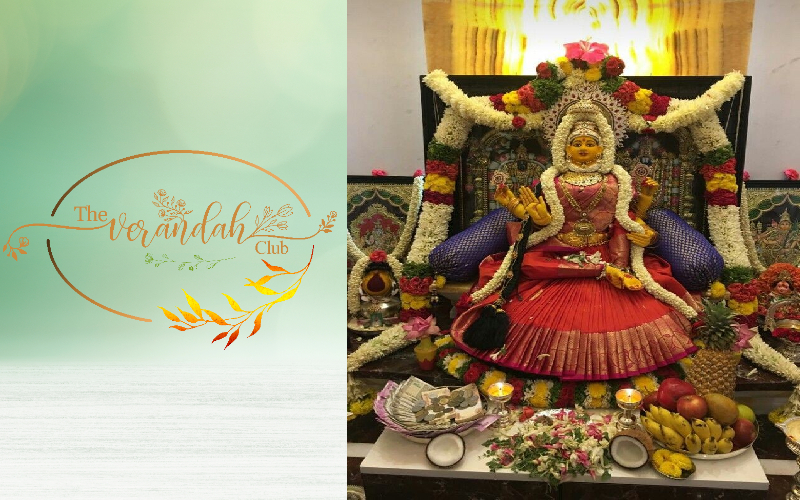
Hiramayīṃ Lakṣmīṃ Pooja
The Hiramayīṃ Lakṣmīṃ Pūjā is to be performed on an auspicious day. However, the days – Vijayadaśamī, Bali Patūjā, Ugadi, and Akṣaya Tṛtīyā are most appropriate. On the anointed day and time get up early in the morning and have an oil shower. Then set up the Pūjā quarter at the house/office/hall in the company of one’s near and dear.
First of all, prepare a Kalaśaṁ with water, coconuts, mango leaves appropriately decorated with kumkum and turmeric. Make a small Kolaṁ in the same area. Ensure that two well-lit lamps, a portrait of Lakṣmī & Nārāyaṇa, Ārtī, sandalwood paste, turmeric, turmeric-dipped rice, milk, kumkum, agarbattī, flowers, betel leaves, and nuts, coconuts, five types of fruits, sweetened Pongal made with milk, dry fruits mixture, a pancapātraṃ and uttarani with water along with five small gold coins with Lakṣmī drawn on the same, a plate, a sealable box, a small container of water, flowers, flower garlands, and a pūjā bell are made available for this auspicious Pooja.
Begin the Pūjā with a ‘Dīpa Mantra’ then follow it up with Ācamanaṃ, Guru Dhyānaṁ, Ganapati Dhyānaṁ, Prānāyāmaṁ, Saṅkalpaṁ, Āsana Pūjā, Ghaṇtā Pūjā, Samasta Upacāra Mantra, Sahasranāma/Aṣtottara Pūjā for Lakṣmī & Nārāyaṇa, Naivedya, Ārtī, and Pradakṣina Namaskāraṁ.
As part of the Pūjā do an Abhiṣheka to the five Lakṣmī coins with milk and water. Use flowers and turmeric dipped rice for the Aṣtottara Pūjā.
On the completion of the Pūjā take the five Hiramayīṃ Lakṣmīṃ coins along with the turmeric dipped rice (Akṣatā) used for the Aṣtottara Pūjā and seal the same in a casket or container. This is not to be disturbed hereafter.
Place this casket or container in the Pūjā of the house, locker or wardrobe in the office or residence.
One becoming a permanent resident of your establishment be it domestic or business the divine mother Hiramayīṃ Lakṣmīṃ will bestow longevity, health, wealth, happiness, good merits, and fame for ever and ever.
“Hiranmayīṃ Lakṣmīṁ Sadā Bhajāmī...”
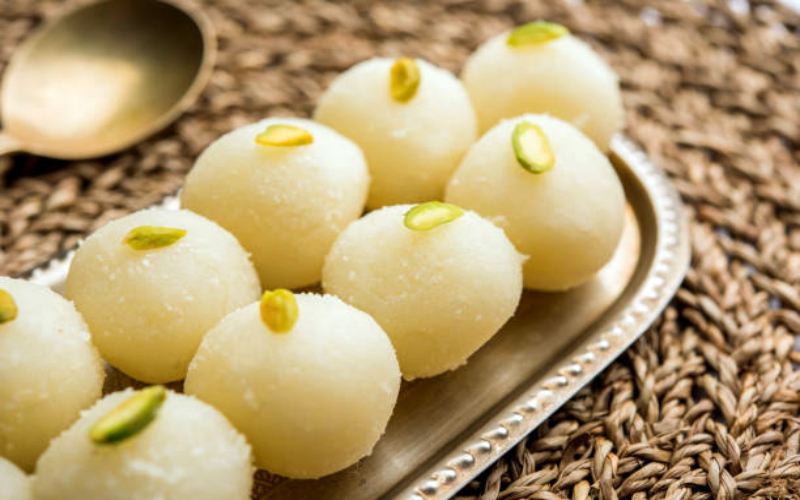
Naivedyaṁ
Goddess Lakṣmī can be offered Rosogolla as Naivedyaṁ after the 'Prosperity Pūjā'. The spongy white Rosogolla is believed to have been introduced by a Kolkata-based confectioner, Nobin Chandra Das in the year 1868. However, historians of Odisha state that the Rosogolla originated in Puri as Khira Mohana. Subsequently it had evolved as Rosogolla. It has been traditionally offered as ‘bhog’ to Goddess Lakṣmī at the Jagannāth Temple in Puri.
According to a local legend, Goddess Lakṣmī gets upset because her husband Lord Jagannāth goes on a nine-day sojourn (Rathayātrā) without her consent. Therefore, she locks the Jaya-Vijaya Dvāra (one of the gates to the temple). The convoy of Lord Jagannāth would get stalled thereafter and this also would prevent the Lord from re-entering the sanctum sanctorum. It is believed that the Lord Jagannāth would offer Rosogolla-s to Goddess Lakṣmī and appease her. The Jagannāth Temple scholars state that the tradition has existed for centuries. Rosogolla is derived from the words ‘Rasa’ (juice) and Golla (ball).
The Goddess of wealth has been ignored many a time. She is very concerned about the way we handle fortune. The Prosperity Pūjā' is done in order to make our mind, body, and thought concentrate on the good things to be done. Every Pūjā' is complete with an offering. Let us offer the Goddess Rosogolla as Prasād/Naivedyaṁ after the performance of the Pūjā'. Śrī Lakṣmī, the Goddess of fortune, will let the sixteen forms of wealth flow into the household. The offering of the sweet Rosogolla symbolically will usher in prosperity to the devotee. This can be done on the completion of the Pūjā' and Ārtī can be performed thereafter.
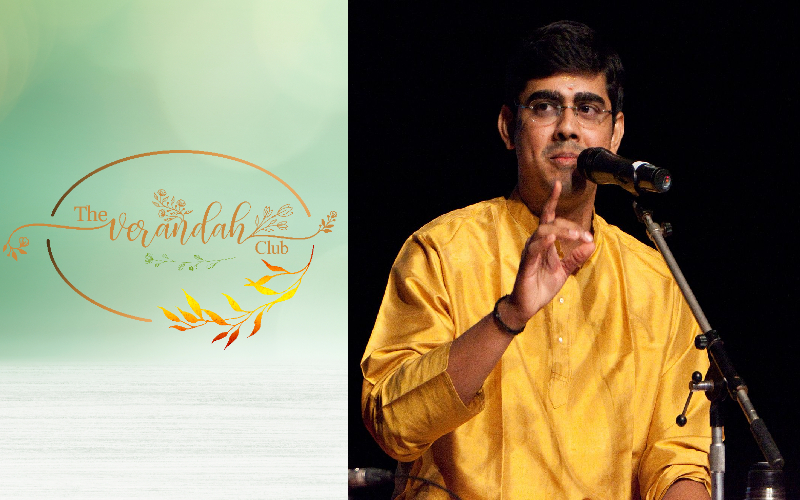
The Special Rendition of Hiranmayīṃ Lakṣmīṁ by Renowned Singer, Sikkil Gurucharan
The song Hiranmayīṃ Lakṣmīṁ was composed by Dīkṣitār in Rāgaṁ Lalitā set to Rūpaka Tāḷaṁ. Rāgaṁ Lalitā is meant for the evening when Goddess Lakṣmī enters the household of her devotees. It is a Janya Rāgaṁ or off-shoot of the famous Melakartā Rāgaṁ, Māyamālava Govlā.
A rendition of the famous song, Hiranmayīṃ Lakṣmīṁ can be accessed by clicking on the website, www.theverandahclub.com. This excellent rendition has been made by the globally renowned Carnatic musician, Sikkil Gurucharan. Shri. Gurucharan is the grandson of the famous flutist, Kunjumani of the duo Neela & Kunjumani.
Connoisseurs of Carnatic Music are quite concerned about the enthralling quality of this great song which binds people to it. This fabulous rendition by Sikkil Gurucharan will sure attract Daiva Sampat to the household of the true devotees of Hiranmayīṃ Lakṣmīṁ.
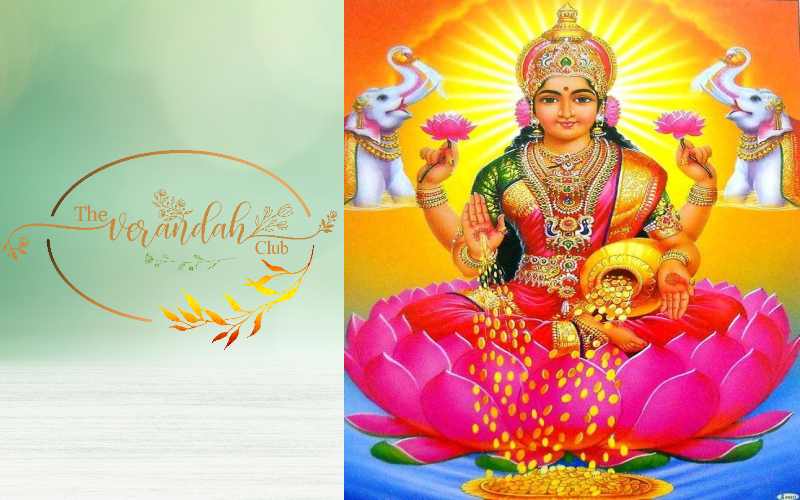
Historical Lessons on Money
Long ago, the Babylonians lived in a beautiful, fortified city and this establishment survived for centuries thanks to the vision of not only the rulers but the citizens as well. The practice of personifying the beauty and wealth of the world existed in Babylon as well, they had Goddess Ishtar, while the Sumerians had Inanna, their equivalent of Goddess Lakṣmī. The Babylonians chronicled their financial practices cum habits on thousands of clay tablets in a script known as Cuneiform. Thanks to the modern archaeological fraternity, we get to understand the guiding principles of Babylonian success. After all was not Babylon popular for its business, community, practices, and the lovely hanging gardens? The citizens of Babylon continued to prosper, and it is but fine to look at their timeless principles that will enable one to acquire the skills require to protect their earnings and multiply the same.
1. Make sure that one does not spend more the nine-tenths of his/her income.
2. One must be sure that he/she budgets his/her expenses in a manner that helps to pay for necessities, luxuries, and to gratify desires without spending more than nine-tenths of the available earnings.
3. Every unit of currency earned is invested in a manner that helps us capable of reproducing its kind akin to flocks of corn in the field and helps the person with an income and steady stream of wealth.
4. Make sure that one's wealth is invested in a safe manner. Ensure that the principal is safe from loss and can be reclaimed if desirable while also earning a fair return. Please secure the advice of these experienced in the profitable handling of resources. Their wisdom is sure to protect one’s treasure from unsafe investments.
5. Own your own home.
6. It must be noted that one provides well in advance for the needs of old age and the protection of the family.
7. One ought to repay debts with necessary promptness and should never indulge in things which cannot be paid for with the available resources. Make sure that the family is well taken care of thereby getting them to think and speak well of the breadwinner. A Will must be made just in case the Gods call the breadwinner/head of the family; the person should take care of an honourable division of the property. One must have compassion upon those who are injured and smitten by misfortune and aid them within reasonable limits. One must perform deeds of thoughtfulness to the near and dear. Surely one must study and become wiser in order to become not only more skilful but to so act. Therefore, he/she may respect oneself.
8. Wealth slips away from the one who invests it in opportunities with which he/she is not familiar, or which are not approved by those skilled in its maintenance.
9. Fortune flees the person who forces wealth to impossible earnings as one who follows the alluring advice of tricksters and schemers or the one who trusts his/her own inexperience and romantic wishes with regard to investment.
The above given nine tenets of money, wealth, and investment was followed by the ancient Babylonians with aplomb. These nine tenets gave them the Nava Nidhi-s or the nine forms of great wealth again subject to the premise that good luck waits to come to the person who accepts opportunity.
May Lakṣmī Sametha Nikṣepavittan bestow good fortune!

Verandah Club Private Limited
The Verandah Club was incorporated in Coimbatore, India. The company is promoted by a team of Directors with an eminent background backed by heritage.
Our country India is the home to the quintessence of global culture and tradition. Thanks to the Indian way of life, it has been possible to preserve and nurture cultural practices, wisdom, art, and craft from time immemorial. Therefore, we continue to move ahead with the earliest civilization on Earth.
India is a treasure trove of several ancient rituals and practices for millenniums together. The Verandah Club has identified the various aspects of Sanātana Dharma which are not spoken of & those habits which are slowly vanishing and has come forth to present the same in an authentic manner.
The readers can be sure to enjoy every moment of their association while also enriching themselves with true meaning and benefit of the ancient methods that will continue to add prosperity for the times to come.
NEXT ARTICLE